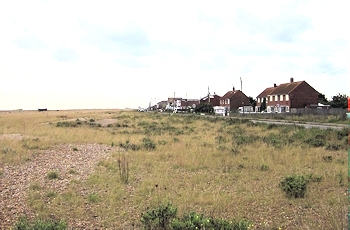Lydd-on-Sea

Lydd-on-Sea is part of the ecclesiastical and civil parish of Lydd, now several miles distant but which once had access to the sea. There are three shops, a convenience store, fish bar and hairdressers. Its only pub, The Ship, has long since closed.
Lade Fort, properly named No 2 Battery, was a fort built in 1798 as part of the defences against Napoleon. Its remains is located off the appropriately named Lade Fort Crescent in Lydd-on-Sea. More information
The Southern Railway opened a railway station here in 1937 but was closed in 1967 because of lack of use. The Romney, Hythe & Dymchurch Railway trains run through Lydd-on-Sea, with the nearest station at holiday park about 1 mile to the north. Bus route 102 runs from Lydd, through Lydd-on-Sea to New Romney and onwards to Folkestone and Dover.

Lydd-on-Sea from the sea
Just to the northwest of Lydd-on-Sea is the site of a collection of Sound Mirrors to detect the approach of enemy aircraft, in the years before radar had been developed.
The beach at Lydd-on-Sea is part of the Dungeness National Nature Reserve, making it popular with bird watchers and nature lovers. The beach is mainly shingle with some sand and then mud at low tide. There is a small car park and toilet. The nature reserve is also to the west of the village.
.jpg)
No 2 Battery (Lade Fort)



